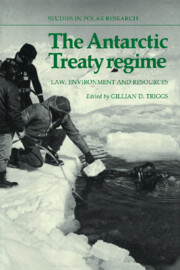Book contents
- Frontmatter
- Contents
- List of contributors
- List of Antarctic Treaty Parties
- Foreword
- Introduction
- Frontispiece: Map of national claims
- Part I Antarctica: physical environment and scientific research
- Part II The Antarctic Treaty regime: legal issues
- Part III The Antarctic Treaty regime: protecting the marine environment
- 9 Introduction
- 10 The Antarctic Treaty system as a resource management mechanism
- 11 Regulated development and conservation of Antarctic
- 12 Recent developments in Antarctic conservation
- 13 Environmental protection and the future of the Antarctic: new approaches and perspectives are necessary
- Part IV The Antarctic Treaty regime: minerals regulation
- Part V Whither Antarctica? Future policies
- Part VI Conclusion
- Selected reading
- Appendix 1
- Appendix 2
9 - Introduction
Published online by Cambridge University Press: 20 January 2010
- Frontmatter
- Contents
- List of contributors
- List of Antarctic Treaty Parties
- Foreword
- Introduction
- Frontispiece: Map of national claims
- Part I Antarctica: physical environment and scientific research
- Part II The Antarctic Treaty regime: legal issues
- Part III The Antarctic Treaty regime: protecting the marine environment
- 9 Introduction
- 10 The Antarctic Treaty system as a resource management mechanism
- 11 Regulated development and conservation of Antarctic
- 12 Recent developments in Antarctic conservation
- 13 Environmental protection and the future of the Antarctic: new approaches and perspectives are necessary
- Part IV The Antarctic Treaty regime: minerals regulation
- Part V Whither Antarctica? Future policies
- Part VI Conclusion
- Selected reading
- Appendix 1
- Appendix 2
Summary
Since the 1970s the Consultative Parties have been concerned to regulate and to minimise man's impact on the Antarctic environment. At the Ninth Consultative Meeting the Parties formally recognised ‘their prime responsibilities for the protection of the Antarctic environment from all forms of human interference’. They have since recommended a Code of Conduct for Antarctic expeditions and station activities, established a meeting of experts to study the effects of oil pollution on the Antarctic environment, adopted a Statement of Accepted Principles and Good Conduct Guide for Tourist Groups and recommended that environmental impact studies be made to evaluate major operations proposed in the Antarctic Treaty area. These measures are hortatory not mandatory, and they depend for their effect upon implementation by those states which choose to accept them.
In 1980 the Consultative Parties negotiated the Convention for the Conservation of Antarctic Marine Living Resources. This Convention is remarkable in many respects. Firstly it was negotiated, ratified and came into force with great speed; a speed which was fuelled by the urgent need to establish some form of regulation for the harvesting of krill and other Antarctic fisheries. The Convention is notable, secondly, for its adoption of a single ecosystem approach to conservation in which the Antarctic Convergence provides the outer limits of jurisdiction. Thirdly, and for the first time within the Antarctic Treaty system, a permanent structure was established by the Convention to give effect to its aims and objectives.
- Type
- Chapter
- Information
- The Antarctic Treaty RegimeLaw, Environment and Resources, pp. 113 - 115Publisher: Cambridge University PressPrint publication year: 1987
- 1
- Cited by

